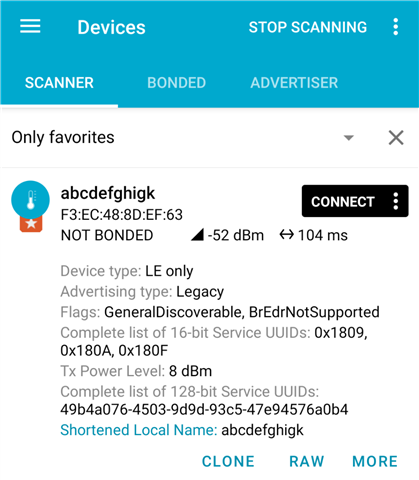Hi,
What macro should be used in the bt_data ad struct in order to advertise a custom 128 bit UUID? I have tried the following: BT_UUID_128_ENCODE(BT_UUID_CUSTOM_SERVICE).
Thanks,
Adam
Hi,
What macro should be used in the bt_data ad struct in order to advertise a custom 128 bit UUID? I have tried the following: BT_UUID_128_ENCODE(BT_UUID_CUSTOM_SERVICE).
Thanks,
Adam
Probably some code snippets that you used might help us see the issue. What kind of errors are you getting?
The eddystone sample uses below initialization to advertise all of 128 bit UUID, just an example to show you.
static const struct bt_data ad[] = {
BT_DATA_BYTES(BT_DATA_FLAGS, (BT_LE_AD_GENERAL | BT_LE_AD_NO_BREDR)),
/* Eddystone Service UUID a3c87500-8ed3-4bdf-8a39-a01bebede295 */
BT_DATA_BYTES(BT_DATA_UUID128_ALL,
0x95, 0xe2, 0xed, 0xeb, 0x1b, 0xa0, 0x39, 0x8a,
0xdf, 0x4b, 0xd3, 0x8e, 0x00, 0x75, 0xc8, 0xa3),
};
Hi Susheel,
I have attached the relevant code below. I am now getting the following error: too big advertising data. It works perfectly when I leave out the other SIG defined UUIDs. The error probably occurs because I am already advertising three other SIG defined services.
1. Is there anyway to encode this 128 bit data into a smaller number that can be advertised?
2. Or would it be a better idea to just include the 128 but UUID in the scan response sd data? If so, I am using the Android nRF Connect app - how do I request scan response data so that I can see the 128 bit UUID.
3. Any other suggestions?
4. Also, what is the max size in bits for a legacy advertising packet?
Thanks so much,
Adam
Here is my advertising struct:
static struct bt_data ad[] = {
BT_DATA_BYTES(BT_DATA_FLAGS, (BT_LE_AD_GENERAL | BT_LE_AD_NO_BREDR)),
BT_DATA_BYTES(BT_DATA_UUID16_ALL,
BT_UUID_16_ENCODE(BT_UUID_HTS_VAL),
BT_UUID_16_ENCODE(BT_UUID_DIS_VAL),
BT_UUID_16_ENCODE(BT_UUID_BAS_VAL)),
BT_DATA_BYTES(BT_DATA_UUID128_ALL, RSSI_SERVICE_UUID),
};
In my service.h file, I have the following:
#define RSSI_SERVICE_UUID 0xb4, 0xa0, 0x76, 0x45, 0xE9, 0x47, 0xC5, \ 0x93, 0x9D, 0x9D, 0x03, 0x45, 0x76, 0xA0, 0xB4, 0x49
#define BT_UUID_RSSI_SERVICE BT_UUID_DECLARE_128(RSSI_SERVICE_UUID)
Thanks.
It works now - I was not sending the sd data originally.
However, now the device name is not printing in full whenever I include sd data. I don't have this issue when I am not sending sd data. Could this be because the advertising packet is too long to fit the full device name?
Thanks,
Adam
adam_atmo said:Could this be because the advertising packet is too long to fit the full device name?
It most likely is too long. How did you split the adv data and the scan response data? Can you show us your new declaration for ad and sd?
Sure, attached below:
static struct bt_data ad[] = {
BT_DATA_BYTES(BT_DATA_FLAGS, (BT_LE_AD_GENERAL | BT_LE_AD_NO_BREDR)),
BT_DATA_BYTES(BT_DATA_UUID16_ALL,
BT_UUID_16_ENCODE(BT_UUID_HTS_VAL),
BT_UUID_16_ENCODE(BT_UUID_DIS_VAL),
BT_UUID_16_ENCODE(BT_UUID_BAS_VAL)),
{ /* TX power adv data */},
};
/* Scan response data.
* Includes 128 bit UUID for custom RSSI service.
*/
static const struct bt_data sd[] =
{
BT_DATA_BYTES(BT_DATA_UUID128_ALL, RSSI_SERVICE_UUID),
};
the ad seems to be of total bytes of 2 (flags) + 1 type for flags + 6 (HTS+DIS+BAS) + 1 (type for HTS/DIS/BAS) + 1 (length field) = 11 bytes.
So you have 27-11 = 16 bytes for device name + type and length, which equals 14 bytes of actual device name.
Thanks Susheel,
However, it seems that it is the introduction of the SD data that limits the length of the name. I don’t have an issue with this when I am not sending scan response data. Have you included the SD data in your calculation?
Thanks Susheel,
However, it seems that it is the introduction of the SD data that limits the length of the name. I don’t have an issue with this when I am not sending scan response data. Have you included the SD data in your calculation?
I was only calculating the actual payload and excluding the headers and other overheads.
adam_atmo said:I don’t have an issue with this when I am not sending scan response data.
i believe that you have a solution with this configuration when you are using scan response data aswell.
Sorry Susheel, I am still confused as to why I cannot see the full name...
In addition to the code that I have already attached, this is what I have in my prj.conf:
CONFIG_BT_DEVICE_NAME="abcdefghigklmnop"
This is what I see on the Android nRF Connect app:

Regards,
Adam
I will try to test this tomorrow, I think you have given me all the information needed to replicate your setup.
Which SDK version are you using Adam, Unable to compile your code in SDKv2.0
I am using NCS v2.00